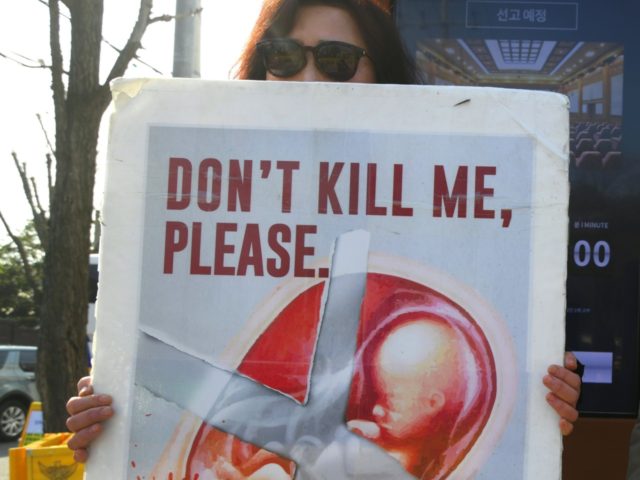Georgia’s new Living Infants Fairness and Equality (LIFE) Act prohibits abortion once a fetal heartbeat is detected, but it will not imprison women who have abortions or miscarriages.
Hollywood celebrities like Alyssa Milano and other columnists have spread misinformation about Georgia’s new law. The legislation bans abortions once the fetal heartbeat is detected, usually at six or seven weeks of pregnancy, with exceptions for cases of rape, incest, or when the life of the mother is endangered.
The new law, however, will not imprison women who have abortions or miscarriages, as some have described:
“Women could get up to 30 years in prison for having a miscarriage under Georgia’s harsh new abortion law,” wrote Grace Panetta at Business Insider.
“In addition to banning abortion after a heartbeat can be detected, the law’s personhood provisions would seem to allow for women who perform their own abortions, travel out of state for an abortion, or are found to be responsible for a miscarriage to be charged with murder,” she said.
“Women Who Have an Abortion in Georgia Could Soon Be Sentenced to Life in Prison,” reads a Glamour headline.
However, abortionists and attackers who would attempt to harm a woman’s unborn child are the focus of the new legislation – not the women themselves.
David French at National Review explained how the thinking of many pro-abortion rights individuals is “fundamentally wrong”:
“The heartbeat bill did not repeal a number of Georgia criminal statutes that explicitly apply to abortions and unborn children, and it does not overrule controlling legal authority holding that these statutes bar prosecution of a woman for terminating her own pregnancy,” he wrote, walking through some of the key statutes that apply to unlawful abortions:
If a person performs an abortion in violation of the heartbeat bill, then Code Section 16-12-140 applies. It does not impose life imprisonment on anybody, and Georgia courts have held that it does not apply to a woman who self-terminates, only to third parties who perform an abortion.
…
[T]he Georgia code section that criminalizes “feticide” (such as when a man attacks a woman for the purpose of killing her unborn baby) specifically states that “nothing in this Code section shall be construed to permit the prosecution of . . . any woman with respect to her unborn child.”
“Taken together, these statutes mean that a woman cannot be prosecuted either for aborting her own baby or committing feticide,” French concluded, adding that the Washington Post also fact-checked claims that the Georgia bill criminalized women who terminated their own pregnancies and found them to be “incorrect.”
“Georgia law is clear,” he wrote. “While abortionists can be prosecuted for performing unlawful abortions — and an attacker can spend the rest of his life in jail for killing a woman’s unborn child — Georgia’s heartbeat bill cannot be used to prosecute a woman for ending her own pregnancy.”
Nicole Russell, columnist at the Federalist, also wrote about Milano’s spread of misinformation.
“She should educate herself on Georgia’s specific statutes before tweeting nonsense,” Russell wrote, once again stressing than punitive measures would be taken against abortionists who defy the law and those whose intention is to attack the mother’s unborn baby.
Though the abortion lobby and its political allies are fond of narratives that portray the pro-life movement as “misogynists” and engaged in a “war on women,” the pro-life community has never condemned women in unplanned pregnancies.
“The focus of the bill was securing the personhood and legal rights of the unborn, not punishing women who are pregnant and unsure of what to do,” Russell said.
“Even though Milano attempts to portray conservative politicians in Georgia as lacking compassion and empathy for mothers, this is a baseless smear,” she added. “The ban doesn’t actually impose any kind of life imprisonment on anyone—the maximum is ten years—particularly not a mother who might try to induce a miscarriage or abortion.”

COMMENTS
Please let us know if you're having issues with commenting.